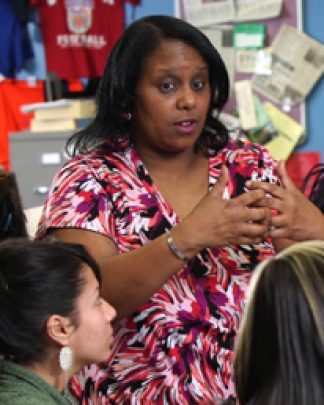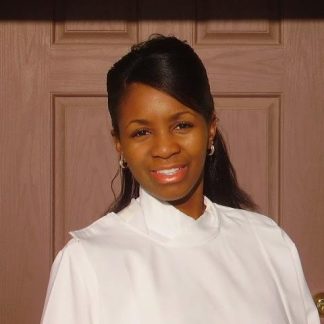“Remember me for what I fought for.”
Tay Anderson tackles big city issues as the new Denver School Board At-Large Director in order to end generational inequity.
[If you haven’t heard of him by now, you want to. Tay Anderson is the youngest Denver School Board At-Large Director to ever be elected into office. Coming from the Denver Schools himself, this spirited activist fights with great tenacity to bring equality within his community. Under his leadership, he has plans to restructure the schools and bring real change in issues ranging from mental health to racial equity. ]
How long have you been the Denver School Board At-Large Director and what led you to that point in your career?
I was elected in November 2019 after running an unsuccessful campaign in 2017 for the Denver School Board. Instead of quitting, I decided to get involved and to become an educator in the district. I realized that there was a need for minority representation and wanted to make that happen. I decided to get involved with Denver School Board again and ran for a second time.
How does your experience as a former student in the Denver Schools impact your decisions as the director?
It gave me first-hand experience, and now, I am able to relate to our children and what they’re going through in the Denver Public Schools. People may say that you need to have political experience to hold office, but I believe that the best experience is from those who have been directly impacted.
Can you briefly explain some of the major issues that you’re currently addressing as the new director?
We’ve already created our 100 day plan for the district under my leadership. I have been pushing for every school to have an all-gender restroom so that students that are a part of the LGBTQIA+ community have a place where they are comfortable going to the restroom in peace. Gender-conforming restrooms may not always do that for our children.
We have also updated the student handbook on gun safety, because gun-violence is a big problem in our communities. We’ve lost over 10 children to gun violence this fiscal year. We implemented the Be SMART program in our schools, working with the Denver Police Department.
We’ve also been increasing our funding towards our Mental Health Counselors, Restorative Justice Counselors, and we have endorsed a measure to allow students to have the right to vote in our School Board elections. I believe that students, sixteen and seventeen years old, have a right to say who’s leading their district. We pushed for that to happen, and now it’s in the hands of the legislature.
How do you plan on addressing institutional racism and closing the equity gap in our public schools?
I believe that the number one thing that we have to do is hire educators that look like our children, so we are constantly striving to find applicators that match the demographics of our kids. We are also figuring out how to teach our history in our schools, and right now we have an incredible group of young black women that are pushing our district to make Black History a graduation requirement.
How do you plan on addressing mental health in the school system, and why do you feel that is important?
It’s one of our top priorities to increase the support found in our schools. We spend tens of millions of dollars on mental health support within our district, but there’s always room to do more, and there’s always room to grow. We want to make sure that we are not being a district that is complacent when it comes to the social-emotional needs of our children.
We are taking bold action and prioritizing our children because we know that teen suicide is on the rise in Colorado. We must make sure that we’re doing our part to combat this issue and at least provide resources so our students do not feel like they are alone during very discouraging times.
What are some ways that the Denver School Board could show more support to their educators?
I would say that providing a livable wage is the first thing. I would also go as far to say that we need to start really valuing the profession and not just looking at it as if anybody can do it. Not just anybody can be a teacher. Teachers are a special group of individuals that I believe need to be held sacred in our communities.
I also believe in empowering the voices of our educators. They should be able to take control of their classrooms, so that they’re not having to follow a playbook, but rather they are able to create their playbook.
Can you talk a little bit about your involvement with the George Floyd and Elijah McClain protests?
Being a black man in America, George Floyd, Trayvon Martin, Sandra Bland, and Elijah McClain all could have been me, or could have been my younger brothers and sisters. That’s the reason why I don’t take these issues lightly, and why I show up for communities.
We often see elected officials show up, give these nice glorified speeches for a moment, and then never follow up with actions. I don’t want to be one of those elected officials that only shows up for our community when it benefits them. I want to show up consistently because I know it’s the right thing to do.
One of the things I told folks while running for office is that I’m not going to change who I am. I’m not going to stop being “Tay the Activist” just because I now and a public figure with a title. That title just gives me more power to implement change in the system from within. I’m going to continue to stay steadfast and to support unity and equality. We’ve had enough of those who get into office by talking about the good things they are going to do, then don’t do them, and still have the nerve to come back four years later and ask for support for another term.
What are some of the challenges that you’ve faced when it comes to changing the neighborhood named “Stapleton”? Could you briefly explain the history behind that name?
Benjamin Stapleton was a former KKK leader, was the mayor in the County of Denver, and held other political offices in the early 1920s. He was honored with an airport that was named after him, and once the airport was decommissioned, it became a neighborhood.
Ever since the neighborhood was named, activists have been fighting to change that name because they understand that upholding white supremacy does not represent, in any way shape or form, who we are as a city.
I simply put out a call to action on Twitter. I’ve always been a supporter of the renamed movement and I don’t take credit for the work that was done to rename Stapleton to Central Park. It was the work of activist organizations like Black Lives Matter and others over the last five years. It was our elders like Dr.Gregory Diggs, who passed away a couple of years ago, that really pushed the rename Stapleton movement forward.
What was some of the best advice that you received from somebody else when you were starting your career?
I think that some of the best advice I’ve received is to be careful of who you’re dealing with. People will try to take advantage of somebody who’s new, young, and going into politics because they don’t know everything. If someone shows you who they are, believe them.
What advice do you have for future generations?
Stay involved, and don’t give up. If we don’t stand up now, we’re going to inherit something that we’re going to be forced to go against once again in the future.
What do you hope to leave as your legacy?
Whenever the sun sets on my time here, I want people to remember not who I was as an individual, but what I fought for. I want people to remember that we stood up for our communities.
The reason why I had to use my voice and run for office wasn’t because I wanted to be in the spotlight, it was simply because I got tired of those who looked like me not representing me. Sometimes, it’s even our own people that are doing wrong to us that are not fighting for us.
That’s why I decided to stand up, and to bring change.
I don’t want a statue, I don’t want a school, I don’t want anything named after me. What I want is to start putting our energy into our future, instead of focusing on the people of the past. Let’s make sure that we live out the memory of those individuals instead of just giving them symbolic gestures. Let’s turn our energy towards action, and implement real change.
Anderson continues to fight for his community, and bring about real change. He is an inspiration to those within the community who feel they don’t have a say in changing the way things are. He gives a voice to the voiceless, and loudly proclaims his call to action for all who want to see more righteousness in the world.
He is unafraid in his acts, and represents what it means to truly be a Voice for the People.
-Written by Talisa Caldwell









